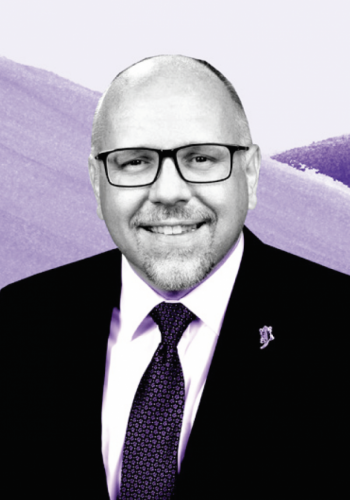Stepping Up
Our career expert discusses how to become a manager — and why some are choosing not to.

Mike Caldwell, executive director of TCU’s Center for Career & Professional Development, answers questions in each issue of TCU Magazine. Send your career questions to tcumagazine@tcu.edu. Image by Nuthawut Somsuk | iStock
Stepping Up
Our career expert discusses how to become a manager — and why some are choosing not to.
Climbing the corporate ladder often means transitioning from doing the work you’re trained to do to managing other people doing that work. But managing others requires a distinct skill set. We talked to Mike Caldwell, executive director of TCU’s Center for Career & Professional Development, about how to prepare for and grow into a managerial role. Caldwell, who pointed out that an increasing number of employees are choosing work-life balance over taking on more responsibility, also shared alternative ways to expand professional horizons.
How important are leadership skills on the job?
When we see surveys and data from employers and they’re asked what skills are important for students to have coming into their roles, leadership always ranks very highly. Leadership may mean different things to different people. Leadership to some managers means basically being able to take ownership for your role, taking responsibility for your tasks, being able to lead a project to a solid conclusion. Leading and managing are two different things.
Which skills are needed to manage a team?
You certainly want someone in that role who has demonstrated initiative and has that big-picture vision. But when it comes to managing people, that is a different skill set that involves being comfortable with very direct conversations with people, being comfortable with thinking forward into the future and also being the type of person who can have strong relationships with a team and know how to foster those relationships in a professional way. And finally, critical thinking. It’s really about decision-making — being able to make really good decisions that are ethical and responsible and within the framework of the company or organization.
What does being a manager mean for work relationships — is it lonely at the top?
When you’re managing and leading people, you have that different dynamic. Ultimately, if you’re a friend of one person and maybe not another person, that’s just going to naturally create that friction of maybe you’re playing favorites. As a manager, especially within a large organization, you may be competing with other managers for budget or on projects. There’s kind of a natural competitiveness that arises. So your relationship with that other manager may not be the same kind of working relationship you would have with a peer.

People now “take that holistic view of their career; they view it as a series of tradeoffs,” said Mike Caldwell in response to a CoderPad survey that found 36 percent of tech workers don’t want to grow into a managerial role.
How can someone cultivate the skills to lead and manage others?
Developing management of your career plan, managing your job search, managing your networking contacts, managing your personal business in terms of who you are — being able to self-manage can really help hone that skill. And just reflecting on where you’ve been and where you want to go can be really important. Getting involved in some organization outside of your work role can really help you hone those skills as well, whether that’s being a volunteer, being part of your community, your church, whatever social organization that you’re a part of.
Neeley professional programs are a great way to level up to a managerial role and/or toward an executive role. The step could begin with a discussion with your supervisor in your current role about advancement strategies and how a professional graduate certificate or degree program could be a benefit.
Learn about TCU Neeley’s graduate program offerings.
You shared a CoderPad survey that found 36 percent of tech workers don’t want to grow into a managerial role. What’s happening?
I think people now take a different approach. They take that holistic view of their career; they view it as a series of tradeoffs. So the additional responsibilities, additional stress — is that worth the return of just a slight increase in pay? I think that’s a calculus that people make probably more frequently than they did in the past. I think people communicate differently, and there’s more salary transparency in a lot of states as well.
I’ve heard from people who are in finance, accounting or other roles; once you become that managing director, 90 percent of what you’re doing is just leading and hiring and coaching and those things, which is not really what drew them to that role. Managing does not have that nice and tidy tangible at the end of the day that you’re checking off. It all just starts over the next morning.
Are there ways to expand or grow in a job without managing others?
Have an entrepreneurial mindset — be able to see opportunities to be creative in your role. Maybe it means taking on additional projects. I think that’s really attractive to a manager or supervisor who wants really great people on their team. That’s something that they’re going to invest in.
I was talking to Terrence [Hood, assistant director of alumni career services & student athletes] about alumni he’s had at some of the events, and a lot of them are wanting to shift careers or change roles. They want to take on more responsibility, but they don’t want to take their boss’s job. So they feel stuck. Do you then shift career paths and do a completely different field? Or do you think about going to that supervisor and doing something a little bit different in your role?
People who are motivated and who are successful — they’re not going to be happy or content to keep doing the same thing. There are a lot of great companies and organizations that do rotational programs now; you’ll rotate through different areas or divisions. And I’ve heard from some alums who really appreciated that. That opens things to a new perspective. I think companies that invest in their employees and do that will be really successful in the future.

Your comments are welcome
Comments
Related reading:
Features
An Epic Comeback
Three decades ago, dedicated alumni led a drive to rebuild TCU’s left-behind athletics program.
Features
A Professional Platform
Our expert says that maintaining a LinkedIn profile benefits both active and passive users.
Features
Building a Brand
Sportscaster Newy Scruggs mixes charisma with business acumen in a thriving on-camera career.